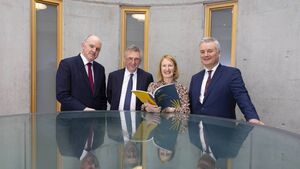SETU delivers over €1billion in economic impact

Dr Colm O’Reardon, Secretary General at the Department of Further and Higher Education, Research, Innovation and Science, Alan Gray, Managing Partner of Indecon, and Chairman of London Economics, with Professor Veronica Campbell, President of SETU, and Professor Patrick Prendergast, Chairperson of SETU’s Governing Body. Photo Patrick Browne, Brownes Photography.
According to a new report, South East Technological University (SETU) has delivered an impact of just over a billion euro on the economy.
On Wednesday, November 26, staff, students, academics, local representatives and stakeholders assembled on campus for the publication of the university’s Economic and Social Impact Study.
The report unveiled key findings on the progress and influence, both economic and social, of the only university within the South East region.
President of SETU Professor Veronica Campbell stated in her speech that the institution is now one the the region's largest employers and generates up to €350 million in return.
She said: "SETU supports over 3,600 jobs both directly and indirectly, employing a network of staff across disciplines and professions at its campuses spanning the South East. We are one of the region’s largest employers. Our international students also enrich our campuses and communities, contributing €28 million every year to the regional economy."
Chairperson of the Governing Body Professor Patrick Prendergast said in his speech: "The findings are clear; SETU is working. It delivers significant value, educationally, economically and socially. The estimated economic impact of the University last year stands at over 1 billion euro. As SETU’s governing body, we are committed to fulfilling our leadership role on the basis of evidence.
“It's why today's economic and social impact study is so important. It provides the reliable information that effective strategic planning requires.”
Prof. Prendergast ended: “With the continued support of government, industry partners and our communities, I am confident that SETU will continue to deliver transformative impact, economically, socially and culturally across the South East and for our country as a whole.” The report was independently developed by economic consultants Indecon.
Managing director at Indecon Alan Gray was at the event and spoke a few words from the podium about the reports’ findings. He said: "Due to its unique position as the only university in the region, SETU is likely to hold greater regional significance than many universities elsewhere in Ireland. SETU plays a vital role in building skills, enabling individuals to achieve their potential, enhancing enterprise capacity, and strengthening the region’s attractiveness for foreign investment and high-skilled employment.”
Dr Colm O’Reardon, Secretary General at the Department of Further and Higher Education, Research, Innovation and Science, gave the final address: commending SETU staff, students and hinted substantial major investment from the Government in the very near future.
Dr O'Reardon said: "I'm very confident that SETU will be a significant beneficiary of that investment, particularly based on everything we've heard today, that will add to the work that we're doing in terms of expanding programs, particularly the veterinary and pharmacy program, and to the work that's going on the car parking, the new STEM building. I think adds up to a significant level of investment in the future that we're talking about, which is about doing what we know works."
The report covered the regional impact of the university in terms of students, showing that the majority of the student body are from the South East region. For the 2023/2024 term, 42.8% of students from Waterford were enrolled at SETU.
The report read: “at least 16% of students said they would be unlikely to go to college or university in Ireland if SETU didn’t exist.” Student numbers are expected to rise by up to 30% by 2040.
In 2024, the South East region accounted for 7.1% of all agency-assisted jobs across Ireland. The agencies include the IDA, Enterprise Ireland and Údarás na Gaeltachta-supported companies. The South East region is at the third-lowest rung nationwide, above the Border region (6.0%) and the Midlands (3.6%).
Prof. Campbell later told the News and Star that her team were ‘absolutely delighted’ by the findings of the Indecon report. She said: “I think it is a really fantastic testament to SETU’s contribution to the region when you’re actually able to put numerical value on that and an economic value in this case.
“It’s the aggregated range of activities that SETU are engaged in that his this overall impact of €1 billion. It shows that for every €1 of public investment into the university, the university generates a return of €5.”
Looking forward, Prof Campbell spoke briefly about the incoming courses for the veterinary and pharmacy courses. She commented: "These programs are on the CEO already, and we are doing some refurbishment of existing spaces, but we also have plans for a new veterinary and pharmacy building on The Glassworks in Waterford."
According to Prof. Campbell, the first veterinary and pharmacy building will be on the former Waterford Crystal site; "All going well, that will be there for 2028."
On the subject of student accommodation, Prof Campbell said sites have been identified on SETU's land and that feasibility studies have bee carried out. She said: "Some of our own student accommodation here is really oversubscribed, and we have many students who are commuting long distances, and we really want to be in a position to provide more student accommodation for them.
"We are engaged with the Department on how we unlock that because we know the importance of having affordable student accommodation at SETU and the South-East."






